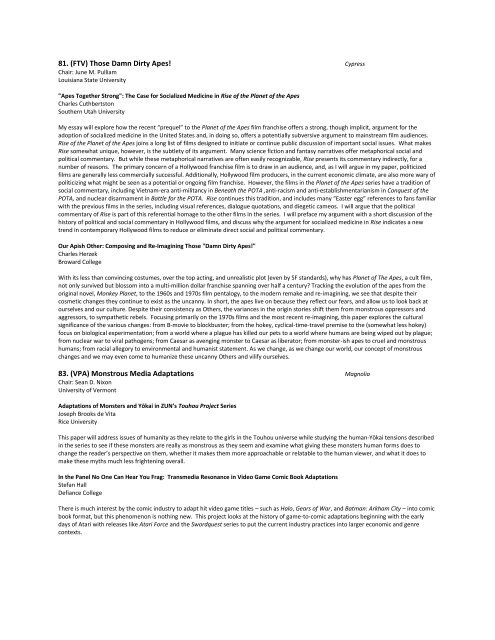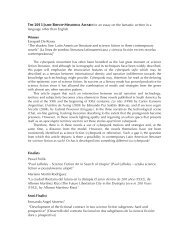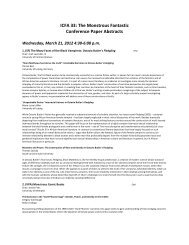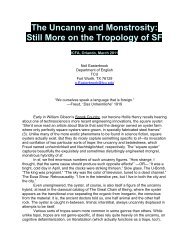In the Wake of the Sea-Serpent: Verne's Textual Monster, Les Histoires de Jean-Marie CabidoulinTerry HarpoldUniversity of FloridaLes Histoires de Jean-Marie Cabidoulin (<strong>The</strong> Sea-Serpent, 1901), is a textual monster. Like all of the Voyages extraordinaires, it is backed by anexacting documentary base, in this case of 19th century accounts of whaling and ocean voyages. Verne’s sources for discussions among thenovel’s characters concerning the existence of sea-serpents are drawn from historic and folkloric records. <strong>The</strong>re are obvious nods in the text to,among others writers, Herman Melville and Heinrich Heine. Closer to home, many of the names of the characters are those of real individualsfrom Verne’s childhood home of Nantes. And Cabidoulin extends Verne’s intertextual methods more radically, via repeated allusions to andcitations from other Verne novels: Vingt Mille lieues sous les mers (Twenty Thousand Leagues Under the Seas, 1870), Voyage au Centre de laTerre (Journey to the Centre of the Earth, 1864), and Maître du Monde (Master of the World, 1904). <strong>The</strong> documentary apparatus of Verne’smost technically-precise account of ocean travel is thus supported by the general textual imaginary of the Voyages extraordinaires. Cabidoulin’smonster, I propose, is typical of the Voyages’ canny, reflexive entanglements of representation and textuality.80. (CYA) <strong>Monstrous</strong> Language Games MapleChair: Dorothy KarlinSimmons College<strong>Monstrous</strong> Myths: Manipulation of Text and Suspension of Disbelief in Octavian Nothing and <strong>The</strong> Knife of Never Letting GoRebekah FitzsimmonsUniversity of FloridaContemporary young adult literature regularly addresses the monstrous. This paper compares the ways in which <strong>The</strong> Astonishing Life ofOctavian Nothing: Traitor to the Nation by M.T. Anderson and <strong>The</strong> Knife of Never Letting Go by Patrick Ness similarly represent the monstrosityof human behavior through the novel use of typography, formatting and other textually based visual techniques. This paper will assert thateven though these two texts are diverse in terms of genre, setting, and plot, the effect of these visual disruptions is the same: a shocking andmemorable depiction of monstrous emotions in the face of horrific conditions. In each book, the text explodes from the pages, breachingmargins and expectations. <strong>The</strong>se moments of textual monstrosity, of unexpected deviation from standard text, are designed to allow thereader to suspend disbelief and break out of standard ways of thinking. <strong>The</strong>se visual markers shatter what the reader has come to accept asthe truth when it comes to the text on the page. This process opens the young reader’s mind and allows them to question the myths andauthority that the texts lay out as fact: if the font in the book is unreliable, perhaps the “facts” are as well. Through the lens of speculativefiction and visual rhetoric, it is thus possible to argue that while Octavian Nothing depicts more realistic and historical events than the Ness’sscience-fiction novel, it takes a more radical leap of faith for American YA readers to accept the monstrous concept that the American FoundingFathers and Revolutionary War Patriots hypocritically condoned the subjugation and torture of slaves, even as they fought for “freedom fromtyranny and equality for all.”Ethics of Nonsense in Lewis Carroll's <strong>Monstrous</strong> LanguageYu-Chi ChiangNational Taiwan Normal UniversityCarroll’s literary nonsense is Hatter’s mad language that “seemed to [Alice] to have no sort of meaning in it, and yet it was certainly English”(AW 56). It is the little crocodile in the nonsense poem that Alice recites with hoarse and strange voice. Never ask what it signifies because rightafter its cheerful grinning “welcomes little fishes in” (AW 16), its smiling jaws surprisingly snap shut to crush our cognitive souls from us. <strong>The</strong>study we present in this essay attempts to attest to the fact that the complex workings of Carroll’s intuitive délire, instead of giving meaninglessgibberish, produce an abundant excess of meaning. In this paper, I will examine the inexhaustible mythical power of nonsense in Carroll’s twoAlice books. In contrast with Nonsense School’s self-referential nonsense, Jean-Jacques Lecercle applies a detour reading through madness tobeckon the demented linguistic monster lurking in the darkness of language to locate the source of intuitions embedded in the literary text ofnonsense and their power of anticipating serious social institutions. From his synchronic account (resistance of intuition against urge ofinstitution) to diachronic account (literature preceding theory), Lecercle’s anticipatory prophecy of nonsense intuitions has gained amomentum to break through the language barriers and embrace life fully with its politics of monstrous resistance. My argument here is thatlanguage and life have the same self-dissolving tendency that a centrifugal resistance of intuition always dissolves the centripetal urge ofinstitution by an excess of errors that not only fills to the brim but also tips over; therefore, the mythic power of Carroll’s literary nonsenserefers beyond language to an ethics of life.
81. (FTV) Those Damn Dirty Apes! CypressChair: June M. PulliamLouisiana State University"Apes Together Strong": <strong>The</strong> Case for Socialized Medicine in Rise of the Planet of the ApesCharles CuthbertstonSouthern Utah UniversityMy essay will explore how the recent “prequel” to the Planet of the Apes film franchise offers a strong, though implicit, argument for theadoption of socialized medicine in the United States and, in doing so, offers a potentially subversive argument to mainstream film audiences.Rise of the Planet of the Apes joins a long list of films designed to initiate or continue public discussion of important social issues. What makesRise somewhat unique, however, is the subtlety of its argument. Many science fiction and fantasy narratives offer metaphorical social andpolitical commentary. But while these metaphorical narratives are often easily recognizable, Rise presents its commentary indirectly, for anumber of reasons. <strong>The</strong> primary concern of a Hollywood franchise film is to draw in an audience, and, as I will argue in my paper, politicizedfilms are generally less commercially successful. Additionally, Hollywood film producers, in the current economic climate, are also more wary ofpoliticizing what might be seen as a potential or ongoing film franchise. However, the films in the Planet of the Apes series have a tradition ofsocial commentary, including Vietnam-era anti-militancy in Beneath the POTA ,anti-racism and anti-establishmentarianism in Conquest of thePOTA, and nuclear disarmament in Battle for the POTA. Rise continues this tradition, and includes many “Easter egg” references to fans familiarwith the previous films in the series, including visual references, dialogue quotations, and diegetic cameos. I will argue that the politicalcommentary of Rise is part of this referential homage to the other films in the series. I will preface my argument with a short discussion of thehistory of political and social commentary in Hollywood films, and discuss why the argument for socialized medicine in Rise indicates a newtrend in contemporary Hollywood films to reduce or eliminate direct social and political commentary.Our Apish Other: Composing and Re-Imagining Those "Damn Dirty Apes!"Charles HerzekBroward CollegeWith its less than convincing costumes, over the top acting, and unrealistic plot (even by SF standards), why has Planet of <strong>The</strong> Apes, a cult film,not only survived but blossom into a multi-million dollar franchise spanning over half a century? Tracking the evolution of the apes from theoriginal novel, Monkey Planet, to the 1960s and 1970s film pentalogy, to the modern remake and re-imagining, we see that despite theircosmetic changes they continue to exist as the uncanny. In short, the apes live on because they reflect our fears, and allow us to look back atourselves and our culture. Despite their consistency as Others, the variances in the origin stories shift them from monstrous oppressors andaggressors, to sympathetic rebels. Focusing primarily on the 1970s films and the most recent re-imagining, this paper explores the culturalsignificance of the various changes: from B-movie to blockbuster; from the hokey, cyclical-time-travel premise to the (somewhat less hokey)focus on biological experimentation; from a world where a plague has killed our pets to a world where humans are being wiped out by plague;from nuclear war to viral pathogens; from Caesar as avenging monster to Caesar as liberator; from monster-ish apes to cruel and monstroushumans; from racial allegory to environmental and humanist statement. As we change, as we change our world, our concept of monstrouschanges and we may even come to humanize these uncanny Others and vilify ourselves.83. (VPA) <strong>Monstrous</strong> Media Adaptations MagnoliaChair: Sean D. NixonUniversity of VermontAdaptations of Monsters and Yōkai in ZUN’s Touhou Project SeriesJoseph Brooks de VitaRice UniversityThis paper will address issues of humanity as they relate to the girls in the Touhou universe while studying the human-Yōkai tensions describedin the series to see if these monsters are really as monstrous as they seem and examine what giving these monsters human forms does tochange the reader’s perspective on them, whether it makes them more approachable or relatable to the human viewer, and what it does tomake these myths much less frightening overall.In the Panel No One Can Hear You Frag: Transmedia Resonance in Video Game Comic Book AdaptationsStefan HallDefiance College<strong>The</strong>re is much interest by the comic industry to adapt hit video game titles – such as Halo, Gears of War, and Batman: Arkham City – into comicbook format, but this phenomenon is nothing new. This project looks at the history of game-to-comic adaptations beginning with the earlydays of Atari with releases like Atari Force and the Swordquest series to put the current industry practices into larger economic and genrecontexts.
- Page 4 and 5: 5. (F) Wondrous Bodies of the Gende
- Page 6 and 7: Fantastic Suicide: Reading the Unca
- Page 8: Viral Posthumanism: Boundaries and
- Page 11 and 12: The Concept of Soul Divisibility in
- Page 13 and 14: Thursday, March 22, 2012 10:30 a.m.
- Page 15 and 16: 21. (CYA) Terrifying Futures: Post-
- Page 17 and 18: 23. (FTV/H) Now I’m Feelin’ Zom
- Page 19 and 20: Fight Club: Amalgam of the Horrific
- Page 21 and 22: Taking the Monsters out of the Clos
- Page 23 and 24: Kaspar J. SaxenaIndependent Scholar
- Page 25 and 26: 44. (CYA) The Monstrosity of Teenag
- Page 27 and 28: 46. (FTV/SF) Monstrous Spin-offs: T
- Page 29 and 30: 49. (F) Aspects of Miéville Captiv
- Page 31 and 32: 53. (SF) War and Crisis in 1940s an
- Page 33 and 34: Abuse of Power: An Evolutionary Res
- Page 35 and 36: Disappearing Natives: The Colonized
- Page 37 and 38: 60. (H/IF) Ancient and Medieval Mon
- Page 39 and 40: 62. (F) The Works of Tolkien Captiv
- Page 41 and 42: 67. (SF) Imperial and Postcolonial
- Page 43 and 44: Beheading the Gorgon: Beautifying C
- Page 45 and 46: 71. (VPA) Monstrous Music MagnoliaC
- Page 47 and 48: 73. (F/IF) Portraying New Worlds Ca
- Page 49: Friday, March 23, 2012 2:45-3:45 pm
- Page 53 and 54: Friday, March 23, 2012 4:00-5:30 pm
- Page 55 and 56: 92. (F) Leaving the Demonized Other
- Page 57 and 58: 94. (FTV/CYA) Monstrosity and Devia
- Page 59 and 60: of cannibalism, ghostly seduction i
- Page 61 and 62: Saturday March 24, 2012 8:30-10:00
- Page 63 and 64: 104. (CYA) Classic Monsters, Reinte
- Page 65 and 66: 107. (VPA) Monstrous Gaming Bodies
- Page 67 and 68: who challenge the order that the Br
- Page 69 and 70: Reading Between the Times: A Critic
- Page 71 and 72: 117. (FTV) Monsters and Superheroes
- Page 73 and 74: 119. (IF/H/PCS) International Mash-
- Page 75 and 76: Focusing on Stoker's Dracula as one
- Page 77 and 78: Florida Atlantic UniversitySheri S.
- Page 79 and 80: Simmons CollegeIn the spate of rece
- Page 81 and 82: Independent ScholarKing’s story
- Page 83 and 84: modernity opens up for every indivi
- Page 85 and 86: Saturday March 24, 2012 4:00-5:30 p
- Page 87 and 88: 141. (FTV) Monstrous Masculinity Cy
- Page 89 and 90: ultimately make peace with her mons
- Page 91 and 92: where the almost-human sentient zom





